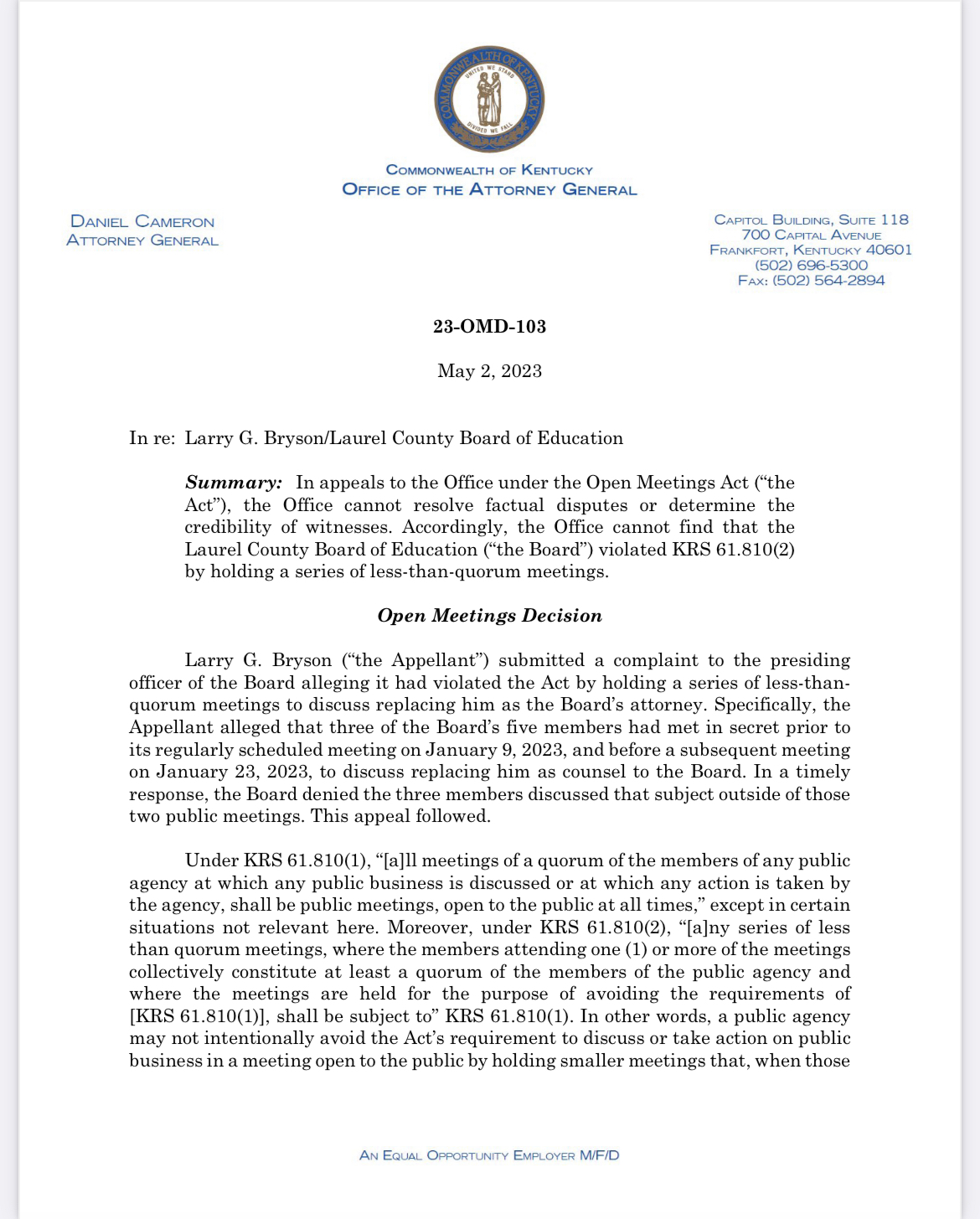
The Kentucky Attorney General issued yet another disappointing open meetings decision last week. The outcome was, candidly, unsurprising. But a footnote in the decision portends open meetings disaster.
Resolution of the open meetings decision in which the footnote appears — In re: Larry G. Bryson/Laurel County Board of Education — turns on whether board members engaged in secret serial less than quorum meetings — in contravention of the open meetings law — by exchanging text messages concerning the proposed removal of the board attorney and the hiring of a new attorney.
https://www.ag.ky.gov/Resources/orom/2023-OROM/2023/23-OMD-103.pdf
Given the virtually unenforceable language of the applicable statute, KRS 61.810(2), the outcome in 23-OMD-103 is another in a long line of decisions in which the attorney general issues a “get out of jail free” card to errant public officials.
https://www.ag.ky.gov/Resources/orom/2020/20-OMD-163.pdf
The statute prohibits “any series of less than quorum meetings, where the members attending one or more of the meetings collectively constitute at least a quorum of the members of the public agency and where the meetings are held for the purpose of avoiding the requirements [the open meetings law] of shall be subject to the requirements of the [open meetings law.]” The statute permits “discussions between individual members where the purpose of the discussions is to educate the members on specific issues.”
https://apps.legislature.ky.gov/law/statutes/statute.aspx?id=52570
Thus, the statute declares secret serial less than quorum meetings — to discuss public business or take action — a violation of the open meetings law but it builds in easy “defenses” that make the violation nearly impossible to prove.
Public agencies routinely defend allegations of KRS 61.810(2) violation by claiming that their secret serial meetings were not held “for the purpose of avoiding the requirements” of the open meetings law and/or that their secret serial meetings were held for the purpose of educating the members on specific issues.
This is unfortunate but true, and it has been since the early 90s when the law was amended to address the problem.
Infinitely more unfortunate is the gratuitous, but potentially catastrophic, statement that appears in footnote 1 of 23-OMD-123 issued last week:
“While the Office[of the Attorney General] previously may have considered written communications, such as emails, among a quorum of members to be subject to the Open Meetings Act, see, e.g., 14-OMD-015, that interpretation lacks textual support from the Act. It also lacks any basis in what the word ‘meeting’ means.”
https://www.ag.ky.gov/Resources/orom/2023-OROM/2023/23-OMD-103.pdf
Let that sink in.
A discussion of public business by “written communications, such as emails,” between a quorum of the members of a public agency is not subject to the open meetings law because “that interpretation lacks textual support from the Act. It also lacks any basis in what the word ‘meeting’ means.” Nor, under this attorney general’s new interpretation, do serial less than quorum “written communications, such as email,” about public business by public agency members collectively constituting a quorum.
And if those written communications by public officials concerning public business are exchanged on private devices or personal accounts — we know from past open records decisions issued by Attorney General Cameron — they are not public records for open records purposes.
https://www.ag.ky.gov/Resources/orom/2021/21-ORD-127.pdf
https://amp.kentucky.com/news/politics-government/article257710593.html
The public is effectively foreclosed from any opportunity to observe how or why public officials reach the decisions they reach or take the actions they take — much less monitor what their elected representatives had to say about that action. What little we learn about that action we learn from the minutes of the meeting which, by law, need only “set[ ] forth an accurate record of votes and actions at such meetings.”
https://apps.legislature.ky.gov/law/statutes/statute.aspx?id=23051
As predicted, the attorney general — having already gutted the open records law by determining that written communications (like email or text) between public officials about public business on the officials’ personal devices or accounts are not public records subject to the open records law* — is on the cusp of gutting the open meetings law by determining that written communications (like email or text) between public officials about public business are not public meetings and are not subject to the open meetings law.
It’s a safe bet that on controversial public questions, officials will resort to “written communication” to evade open records and open meetings laws and thus evade accountability.
The attorney general issues an invitation to those officials to evade scrutiny by conducting the public’s business by means of publicly inaccessible “written communication.”
In 23-OMD-103, the attorney general concludes that it is “not necessary to decide that question here, however, because none of the text messages provided on appeal document three Board members discussing” public business — a questionable conclusion in itself.
But the attorney general has signaled what is likely to come if the facts are directly presented on appeal — and the consequences for the open meetings law are nothing short of devastating.
*This issue is currently on cross appeal in the Kentucky Court of Appeals in Kentucky Open Government Coalition v Kentucky Department of Fish and Wildlife Resources Commission, Case Number 2022-CA-0170-MR.


